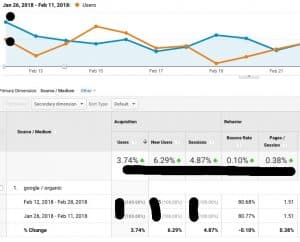As an experiment of sorts, I decided to delete and completely removed the disavow file that I had uploaded to Google’s Disavow Tool. For the past several years, on an off (about every 3 months or so), I have been reviewing the backlinks to this website, BillHartzer.com, and disavowing links to the site. When disavowing links, I would sometimes see some good results–but nothing to write home about. Nothing that would make the website suddenly rank really well for the keywords I’m targeting on this website. But nothing negative would happen, as well–the site didn’t generally lose any search engine rankings or traffic from organic search. That’s kind of expected, though.
I’ve Been Cleaning Up Link Profiles and Links for Years
As a part of what I did when I worked as a Senior SEO at an agency in the past, and what I continue to do for clients, I clean up link profiles of websites. I have been cleaning up link profiles for over 10 years. That’s what I do. I’ve been identifying low quality links, sending link removal requests, and removing manual actions involving links for years.
I’ve been Disavowing Links for Years
I started disavowing links for client websites the day the tool was announced. And I’ve used the disavow tool as a part of my link cleanup and manual action removal services for years. I have never had a situation where a manual action or link penalty from Google has not been removed. I always get them removed. Disavow files are a part of that process–although you really do have to make a significant effort to not only disavow links but to get those bad links removed.
There was the time that a HARO (Help A Reporter Out) request got my client’s website a manual action from Google. I was able to get the manual action removed, and Google took swift action with HARO and the offending journalist/reporter/media outlet involved. So needless to say, I know links.
What Links Do I Disavow?
I disavow links that violate Google’s webmaster guidelines regarding link schemes. They’re very particular about the types of links that should violate their guidelines, and it’s fairly easy to identify those. I also tend to disavow links that violate the USA FTC guidelines (i.e., paid links that are not disclosed as being paid or sponsored). I could go on and on about which links I disavow and why, but that’s only really something that I can teach in a full day course on link disavows.
What happened when I removed the disavowed links?
In this latest disavow file, or I should say, “disavow files”, I removed and completely deleted the files. As you should be aware, for my domain, BillHartzer.com, I have four disavow files, one for each version of the site:
- http://billhartzer.com
- https://billhartzer.com
- http://www.billhartzer.com
- https://www.billhartzer.com/
I upload the same disavow file to all versions of the site, and each version of the site is verified in Google’s Search Console. There are links pointing to each version of the site, and I want to make sure that Google disavows all of these links. But in this case, there were disavow files for each version.
I removed and deleted the disavow files. It’s been 17 days now since I deleted the disavow files for this domain name.
So what happened to Google organic traffic since I deleted the disavow files?

Traffic from Google organic search has gone up (sessions) about 5 percent. What’s important to note, though, is that traffic has NOT gone down. It’s not that I’m seeing a huge increase. But, it’s more telling that traffic from organic search, after 17 days, has not gone down.
In order for a link to truly be disavowed by Google, Google must crawl the page that’s linking to you. Once that page has been cached (in the Google cache), you can assume that Google is taking the disavow file into account for that link to your site.
It’s been 17 days since I deleted the disavow files, so I am assuming that Google has crawled the majority (if not all) of the links pointing to my site that were in the disavow files.
Should You Use the Disavow Tool?
Based on my results for my website, and me removing the disavow files for my site, does that mean you should do the same? Absolutely not. I wouldn’t necessarily make a decision about disavowing or not disavowing links based on my personal results. Whether or not you should still use the disavow tool depends on your particular situation.
I still disavow links
In fact, I’m going to disavow a bunch of links for a client’s website this afternoon because of what their previous SEO firm did to them. The SEO firm built a bunch of targeted anchor text links on splogs (spam blogs that they created) and pointed those links to the client’s website. Some posts on the blog are completely off-topic, and the sites’ home pages have posts about computer related topics, restaurant topics, and healthcare topics, all on the same home page. It’s so obvious that it’s a spam blog that anyone visiting it (if it has any traffic at all?) would leave immediately.
So, it really depends on the links that are pointing to the website currently. I typically recommend getting the links removed–as Google is already most likely disavowing and/or ignoring certain links to your website. If you can’t get them removed, then disavow them.
But again, disavowing may or may not help or hurt. I removed the disavow files, and am not seeing any negative effects on organic search traffic. Your mileage may vary.
Follow the Discussion on Facebook
I Deleted My Disavow File. You’ll Never Guess What Happened.
Posted by Bill Hartzer on Thursday, March 1, 2018